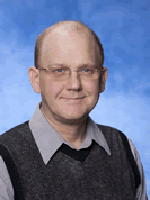Jonathan Stevens
Jonathan Stevens
Associate Professor of Physical Chemistry


Degrees
- Ph.D., Chemistry, University of Chicago
- B.S., Chemistry & Mathematics, Miami University (of Ohio)
Biography
Associate Professor of physical chemistry and teaches physical chemistry, freshman introductory chemistry and chemistry for non-science majors. His research program focuses on the use of quantum-mechanical molecular orbital calculations to study the kinetics and mechanisms of atmospheric reactions.
Dr. Stevens received B.S. degrees in chemistry and mathematics from Miami University (of Ohio) and his Ph.D. in chemistry from the University of Chicago. He has completed postdoctoral studies with Professor Keiji Morokuma at Emory University in Atlanta, and has taught freshman chemistry at Truman State University in Missouri. Dr. Stevens joined the faculty in 1998.
Research Interests:
Description or investigation of reaction mechanisms using molecular orbital theory.
Publications
Review Publications
Mark Anthony, B. & Stevens, J. (2017). Virtually going green: The role of quantum computational chemistry in reducing pollution and toxicity in chemistry. Physical Sciences Reviews, 2(7) https://doi.org/10.1515/psr-2017-0005
Pedagogical Publications:
Stevens, J. Mio, M, Bartley, D., Benvenuto, M. “Print is Dead - A Year Without Textbooks in General and Organic Chemistry:Alternatives to Using Traditional Textbooks” MSTA (Michigan Science Teachers Association) Journal,2012,25-32
Computational Chemistry as a Teaching Tool in a Physical Chemistry Course. Jonathan E. Stevens, appears in "What does Industry Want From Chemistry Graduates?" Proceedings of the 9 November 2002 Meeting of the Michigan College Chemistry Teachers Association, Plus Some Novel Teaching Techniques and Pedagogy" edited by M. Benvenuto and M. Mio. ISBN 0-9725689-5-6
Recent Refereed Publications
Stevens, J. E. ; Macomber, L. D. ; Davis, L. W. "IR Spectra and Vibrational Modes of the Hydrofluoroethers CF3OCH3, CF3OCF2H, and CF3OCF2CF2H and Corresponding Alkanes CF3CH3, CF3CF2H, and CF3CF2CF2H" The Open Physical Chemistry Journal, 2010, 4,17-27
Lund, A. ; Macomber, L. D. ; Danilczuk, M. ; Stevens, J. E. ; Schlick, S. "Determining the Geometry and Magnetic Parameters of Fluorinated Radicals by Simulation of Powder ESR Spectra and DFT Calculations: The Case of the Radical RCF2CF2• in Nafion Perfluorinated Ionomers" J. Phys. Chem. B. 2007, 111,9484-9491.
Stevens, J. E. ; Davis, L. W. ; Mertes, C. D.; Reactions of CF3CH2I+O(3P): Competing mechanisms of HF elimination, J. Chem. Phys. 2007, 126, 074310
Stevens, J. E.; Jabo Khayat, R. A.*; Radkevich, O.*; Brown, J.* CF3CFHO vs. CH3CH2O: An Ab Initio Molecular Orbital Study of Mechanisms of Decomposition and Reaction with O2. J. Phys. Chem. A., 2004, 108, 11354-11361
Sulbaek Andersen, M. P.; Nielsen, O. J.; Hurley, M.D.; Ball, J. C.; Wallington, T. J.; Stevens, J.E.; Martin, W.; Ellis, D. A.; Mabury, S. A. Atmospheric Chemistry of n-CxF2x+1CHO (x=1,3,4): Reaction with Cl atoms, OH Radicals; IR Spectra of CxF2x+1C(O)O2NO2." J. Phys. Chem. A. 2004, 108, 5189-5196.
Free Radical Complexes of copper(I): geometry and ground state, J.E. Stevens, D.J.R. Brook, and V.W. Abeyta, Polyhedron 22 (2003) 2241-2247
Molecular orbital study of mechanisms of the reactions of alkyl bromides with O(3P) atoms, J.E. Stevens, M.S. Kaufman, and K. Morokuma, J. Chem. Phys. 118, 6964 (2003)
Coordination Chemistry of Verdazyl Radicals: Group 12 Metal (Zn,Cd,Hg) Complexes of 1,4,5,6 tetrahydro-2,4-dimethyl-6-(2’-pyridyl)-1,2,4,5-tetrazin-3(2H)-one(pvdH3) and 1,5-Dimethyl-3-(2’ pyridyl)-6-oxoverdazyl (pvd), D.J.R. Brook, S. Fornell, J.E. Stevens, B. Noll, T.H. Koch and W. Eisfeld, Inorg. Chem., 39, 562 (2000).
Grants and Awards:
Petroleum Research Fund, Ford Laboratories, National Cen ter for Supercomputing Applications
